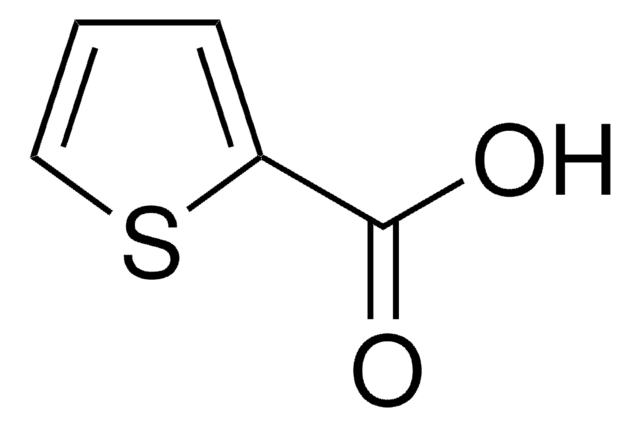W392103
2,4-Hexadienoic acid
≥99%, FCC
Synonym(s):
Sorbic acid, α-trans-γ-trans-Sorbic acid, (E,E)-1,3-Pentadiene-1-carboxylic acid, 2,4-Hexadienoic acid, 2E,4E-Hexadienoic acid, trans,trans-2,4-Hexadienoic acid, C6:2n-2,4, NSC 35405, NSC 49103, NSC 50268
About This Item
Recommended Products
biological source
synthetic
Agency
meets purity specifications of JECFA
reg. compliance
FCC
FDA 21 CFR 166.110
FDA 21 CFR 172.872
FDA 21 CFR 177.2260
FDA 21 CFR 181.23
FDA 21 CFR 182.3089
vapor pressure
0.01 mmHg ( 20 °C)
Assay
≥99%
form
powder
mp
132-135 °C (lit.)
solubility
ethanol: 10%, clear, colorless to slightly yellow
density
1.2 g/cm3 at 20 °C
cation traces
As: ≤3.0 ppm
Cd: ≤1.0 ppm
Hg: ≤1.0 ppm
Pb: ≤2.0 ppm
application(s)
flavors and fragrances
Documentation
see Safety & Documentation for available documents
food allergen
no known allergens
Organoleptic
odorless
SMILES string
C\C=C\C=C\C(O)=O
InChI
1S/C6H8O2/c1-2-3-4-5-6(7)8/h2-5H,1H3,(H,7,8)/b3-2+,5-4+
InChI key
WSWCOQWTEOXDQX-MQQKCMAXSA-N
Looking for similar products? Visit Product Comparison Guide
Signal Word
Warning
Hazard Statements
Precautionary Statements
Hazard Classifications
Eye Irrit. 2 - Skin Irrit. 2
Storage Class Code
11 - Combustible Solids
WGK
WGK 1
Flash Point(F)
260.6 °F - closed cup
Flash Point(C)
127 °C - closed cup
Personal Protective Equipment
Regulatory Listings
Regulatory Listings are mainly provided for chemical products. Only limited information can be provided here for non-chemical products. No entry means none of the components are listed. It is the user’s obligation to ensure the safe and legal use of the product.
JAN Code
W392103-SAMPLE:
W392103-1KG:
W392103-VAR:
W392103-5KG:
W392103-BULK:
W392103-10KG:
Certificates of Analysis (COA)
Search for Certificates of Analysis (COA) by entering the products Lot/Batch Number. Lot and Batch Numbers can be found on a product’s label following the words ‘Lot’ or ‘Batch’.
Already Own This Product?
Find documentation for the products that you have recently purchased in the Document Library.
Customers Also Viewed
Our team of scientists has experience in all areas of research including Life Science, Material Science, Chemical Synthesis, Chromatography, Analytical and many others.
Contact Technical Service










